
Majdanek was a Nazi concentration and extermination camp built and operated by the SS on the outskirts of the city of Lublin during the German occupation of Poland in World War II. It had seven gas chambers, two wooden gallows, and some 227 structures in all, placing it among the largest of Nazi concentration camps. Although initially intended for forced labor rather than extermination, it was used to murder people on an industrial scale during Operation Reinhard, the German plan to murder all Polish Jews within their own occupied homeland. In operation from 1 October 1941 to 22 July 1944, it was captured nearly intact. The rapid advance of the Soviet Red Army during Operation Bagration prevented the SS from destroying most of its infrastructure, and Deputy Camp Commandant Anton Thernes failed to remove the most incriminating evidence of war crimes.
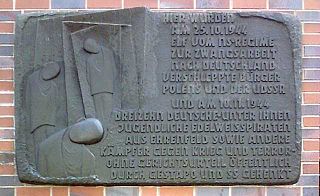
The Edelweiss Pirates were a loosely organized group of youths opposed to the status quo of Nazi Germany. They emerged in western Germany out of the German Youth Movement of the late 1930s in response to the strict regimentation of the Hitler Youth. Similar in many ways to the Leipzig Meuten, they consisted of young people, mainly between the ages of 14 and 17, who had evaded the Hitler Youth by leaving school and were also young enough to avoid military conscription, which was only compulsory from the age of 17 onward. The roots and background of the Edelweiss Pirates movement were detailed in the 2004 film Edelweiss Pirates, directed by Niko von Glasow.
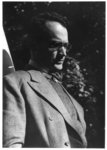
Varian Mackey Fry was an American journalist. Fry ran a rescue network in Vichy France that helped 2,000 to 4,000 anti-Nazi and Jewish refugees to escape from persecution by Nazi Germany and in countries controlled by the Nazis. He was the first of five Americans to be recognized as "Righteous Among the Nations", an honorific given by the State of Israel to non-Jews who risked their lives to save Jews during the Holocaust.

The United States Holocaust Memorial Museum (USHMM) is the United States' official memorial to the Holocaust. Adjacent to the National Mall in Washington, D.C., the USHMM provides for the documentation, study, and interpretation of Holocaust history. It is dedicated to helping leaders and citizens of the world confront hatred, prevent genocide, promote human dignity, and strengthen democracy.
This is a selected bibliography and other resources for The Holocaust, including prominent primary sources, historical studies, notable survivor accounts and autobiographies, as well as other documentation and further hypotheses.

Holocaust (1978) is an American television miniseries which aired on NBC over five nights, from April 16–20, 1978.

The 1940 AB-Aktion, a second stage of the Nazi German campaign of violence in Poland during World War II, aimed to eliminate the intellectuals and the upper classes of the Second Polish Republic across the territories slated for eventual annexation by the German Reich.

Harald Reinl was an Austrian film director. He is known for the films he made based on Edgar Wallace and Karl May books and also made mountain films, Heimatfilms, German war films and entries in such popular German film series as Dr. Mabuse, Jerry Cotton and Kommissar X. His directing output includes more than 60 titles. With his Edgar Wallace and Karl May adaptations, Reinl advanced to become one of the most successful directors in German cinema in the 1960s: with the four Karl May films he made between 1962 and 1965 alone, Reinl reached 32 million viewers.
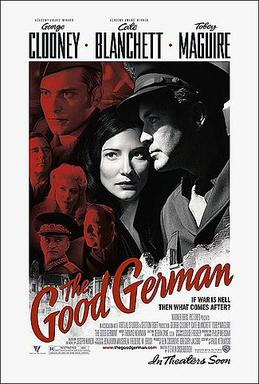
The Good German is a 2006 American neo-noir crime film. A film adaptation of Joseph Kanon's 2001 novel of the same name, it was directed by Steven Soderbergh, and stars George Clooney, Cate Blanchett, and Tobey Maguire. Set in Berlin following the Allied victory over the Nazis, it begins as a murder mystery but weaves in elements involving the American postwar employment of Nazi rocket scientists in Operation Paperclip.

None Shall Escape is a 1944 war film. Even though the film was made during World War II, the setting is a post-war Nuremberg-style war crimes trial. Alexander Knox plays Wilhelm Grimm, a Nazi officer who is on trial, and the story unfolds through the eyes of several witnesses, including a Catholic priest, Father Warecki, Grimm's brother Karl and Marja Pacierkowski, a woman to whom he was once engaged.

The Ehrenfeld Group, sometimes called the Steinbrück Group, was an anti-Nazi resistance group, active in the summer and autumn of 1944.
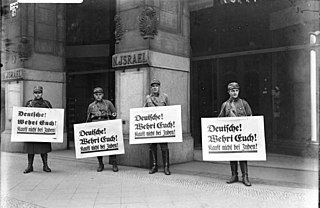
The Nazi boycott of Jewish businesses in Germany began on April 1, 1933, and was claimed to be a defensive reaction to the anti-Nazi boycott, which had been initiated in March 1933. It was largely unsuccessful, as the German population continued to use Jewish businesses, but revealed the intent of the Nazis to undermine the viability of Jews in Germany.

Anti-Jewish legislation in pre-war Nazi Germany comprised several laws that segregated the Jews from German society and restricted Jewish people's political, legal and civil rights. Major legislative initiatives included a series of restrictive laws passed in 1933, the Nuremberg Laws of 1935, and a final wave of legislation preceding Germany's entry into World War II.
USC Shoah Foundation – The Institute for Visual History and Education, formerly Survivors of the Shoah Visual History Foundation, is a nonprofit organization dedicated to making audio-visual interviews with survivors and witnesses of the Holocaust a compelling voice for education and action. It was established by Steven Spielberg in 1994, one year after completing his Academy Award-winning film Schindler's List. In January 2006, the foundation partnered with and relocated to the University of Southern California (USC) and was renamed the USC Shoah Foundation – The Institute for Visual History and Education. In March 2019, the institute opened their new global headquarters on USC's campus.

CCC Film is a German film production company founded in 1946 by Artur Brauner. A Polish Jew who survived the Nazi era by fleeing to the Soviet Union, he lost dozens of relatives to the Nazis. His primary interest was making films about the Nazi era, but after his first such film failed at the box office, throwing him into debt, he began producing entertainment films, the commercial success of which then financed his Holocaust-related films, some of which also became successful. In 2009, Brauner donated 21 Holocaust-related films to Yad Vashem.
Axel Herbert Ewald Ripke was a German journalist and politician of the German Fatherland Party and the Nazi Party (NSDAP). Among other things, he was one of the first Gauleiters of the NSDAP and an early mentor of Joseph Goebbels.
Karl Albert Schleunes was an American historian of the Holocaust and the German Empire. He was a professor at the University of North Carolina at Greensboro (UNCG). Schleunes obtained his Bachelor in 1959 at Lakeland College (Wisconsin), and his Master's at the University of Minnesota in 1961, where he also received his Ph.D. in 1966. From 1965 to 1971 he taught at the University of Illinois at Chicago. Since then he was at the UNCG. In 1999 he was a guest lecturer at the Kaplan Centre of the University of Cape Town.

Rochelle G. Saidel is an American writer and researcher. She founded the Remember the Women Institute in 1997 and currently serves as its executive director.
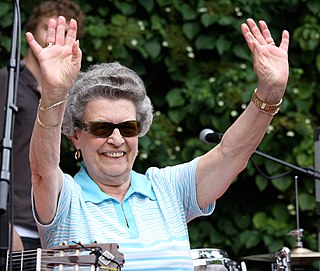
Gertrud Koch was a German resistance fighter during World War II. She is best known for being a member of the youth group Edelweiss Pirates.
Nazi crimes against children refer to various crimes against humanity and war crimes perpetrated by the Nazi Germany against children.













